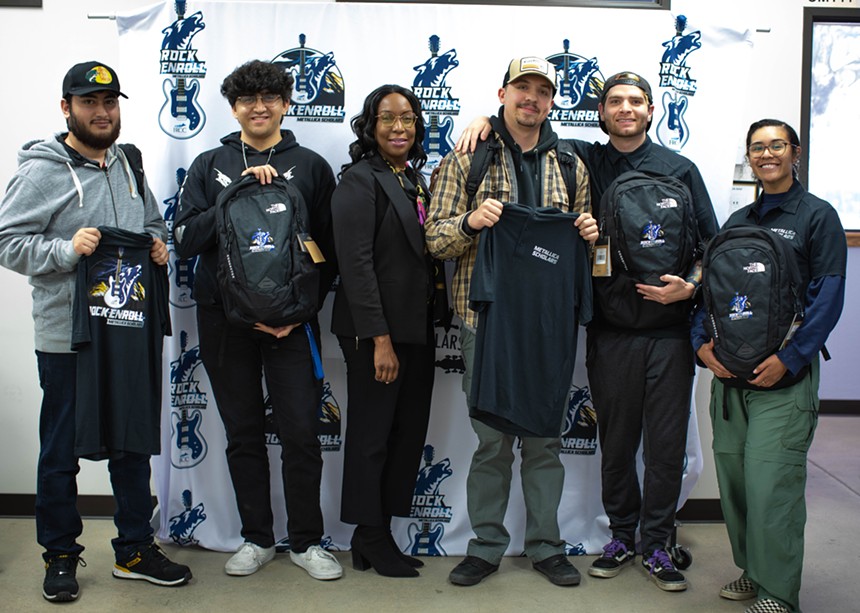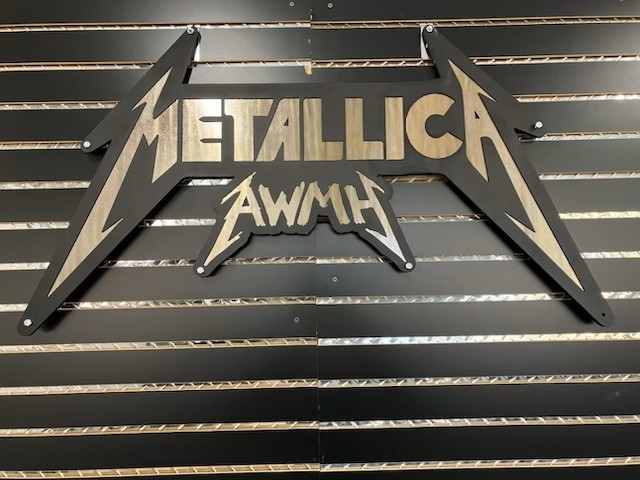How Metallica Is Helping Front Range Community College Students Get Jobs

Metallica created the program six years ago. All Within My Hands
Share this:
“There’s a nationwide talent crisis in skilled labor,” says Chris McGilvray, dean of the manufacturing program at Front Range Community College.
Now, support for closing that gap in the workforce is coming from an unlikely source: Metallica, one of the greatest heavy-metal bands in history.
Metallica Scholars is a scholarship program supporting education in trades and skilled labor, and it’s entering its second year of funding at Front Range Community College.

The first class of Metallica Scholars with FRCC President Colleen Simpson, EdD.
Front Range Community College
Nearly six in ten jobs in the United States do not require a bachelor’s degree, and many folks are waking up to the serious need for skilled technical labor. Members of Gen Z in particular, as the Wall Street Journal reported, are enrolling in vocational-focused community colleges at a continuously rising rate. “We’re preparing students to enter and be productive in the workforce,” McGilvray says.
Metallica Scholars funds programs that help students learn the skills needed for “high-pay, high-tech jobs,” McGilvray explains. “Being chosen to participate in Metallica Scholars speaks volumes for the quality of our program, and it’s a true honor to be selected.”
During its first year at the school, Metallica Scholars provided Front Range with a $100,000 grant, which supported student scholarships in five programs and added a welding program. Schools aren’t restricted in how they use the money, so Front Range was also “able to use some funds for a tutoring and support program in our technical math class,” McGilvray adds. “Historically students struggle, and sometimes the success rate is 50 percent. After we began offering one-on-one tutoring, the success rate went to 80 percent.”
Programs like Metallica Scholars can help break the bachelor-degree stigma, as well as de-stigmatize skilled labor as a career. “These are expensive programs to operate,” McGilvray notes. “We have millions of dollars in equipment and valuable workforce sector partnerships” that will ultimately employ the graduates. Most students have jobs before they even complete the program, and enrollment has seen significant increases, especially as the school is the only one in Colorado that offers an advanced degree in applied optics.
So what’s the connection between rock music and trade-school education, and how did these kings of heavy metal get involved?
“Metallica, as a band, always gave back to the communities that supported them,” says Renee Richardson, director of philanthropy for Metallica’s foundation, All Within My Hands, which the band created in 2018. “So when they were on the road, they would support local food banks or other community services.”
The impetus for supporting education, specifically in the trades, came about when lead singer and guitarist James Hetfield’s kids were in school. Richardson notes that all the bandmembers are on the foundation’s board, and at a meeting, “James stood up and passionately spoke up about how his kids were coming through school and no one was telling them they could have a very successful career working with their hands, as a plumber or carpenter or mechanic.”

A Metallica Scholars logo created by the welding faculty at FRCC.
Chris McGilvray
He proposed that All Within My Hands could somehow support trade education, and that discussion was the genesis for funding community college programs that develop skilled labor.
Shortly after that board discussion, the foundation’s executive director, Dr. Ed Frank, met with Jen Worth of the American Association of Community Colleges and created a partnership between the entities, forming Metallica Scholars six years ago. The first year, ten schools each received $100,000 to support career and technical education. Now the program is in all fifty states among sixty schools, and the band has invested more than $10 million in workforce trade education.
“When we launched the Metallica Scholars Initiative, it really spoke to me,” says Hetfield in a statement. “A collective goal of breaking the stigma of trade skills. Trade skills are vital to society, and what’s even more important is to support the many folks who are trying to create a career by learning and using these skills. I am so proud — we all are — to see how this program is changing lives by providing much-needed resources to empower students.”
That empowerment has the potential to be life-changing for students. According to McGilvray, most students at FRCC are first-generation college students. And with the brand recognition associated with Metallica, he says, “we are seeing more adult learners, and we’re able to bring in more people who might not have considered pursuing this training. Higher education is not billed for part-time learners, but most of our students have jobs and other responsibilities. So we have reframed what our program looks like for them, asking how we can strategically look at scheduling, how we can improve advising, how we can offer support like math tutoring. Metallica’s foundation has helped with that, for sure.”
“We’re changing lives,” McGilvray concludes. “People are now associating Front Range Community College as a hip, cool place to learn the trades, and that’s a direct result of our partnership with Metallica.”
News
Breaking: An executive order prohibiting transgender people from playing women’s sports is about to be signed by Donald Trump.
BREAKING: Donald Trump Set To Sign Executive Order Banning Transgenders From Participating In Women’s Sports On February 5, 2025, President Donald Trump signed an executive order titled “Keeping Men Out of Women’s Sports,” which prohibits transgender girls and women from…
Regarding Donald Trump’s intentions to attend Super Bowl 59, Travis Kelce expresses his feelings rather clearly. tt
Travis Kelce Makes His Feelings Very Clear On Donald Trump’s Plans To Attend Super Bowl 59 It looks like Travis Kelce is taking a diplomatic and professional approach, focusing on the magnitude of the Super Bowl rather than any political…
With a massive trade proposal, the Phoenix Suns set the NBA on fire by trading superstar Kevin Durant to a Western Conference heavyweight. tt
Phoenix Suns Set The NBA On Fireworks By Dealing Superstar Kevin Durant To Western Conference Heavyweight In Massive Trade Proposal That trade proposal is definitely a blockbuster and could shake up the Western Conference in a huge way. If the…
BREAKING: Buffalo Bills All-Pro Superstar Makes Shocking Retirement Announcement After Team’s Heartbreaking Playoff Loss To Chiefs. tt
BREAKING: Buffalo Bills All-Pro Superstar Makes Shocking Retirement Announcement After Team’s Heartbreaking Playoff Loss To Chiefs Buffalo Bills helmet (Photo by Patrick Smith/Getty Images) Former Buffalo Bills star safety Micah Hyde is walking away from the game after an 11-yer career in…
Jimmy Butler of the Miami Heat was acquired by the Dallas Mavericks in a blockbuster trade proposal, once again stunning the NBA. tt
Dallas Mavericks Stun The NBA Again By Acquiring Miami Heat Superstar Jimmy Butler In Blockbuster Trade Proposal As of February 5, 2025, the Dallas Mavericks have not acquired Miami Heat’s All-Star guard Jimmy Butler. However, the team has been active…
Myles Garrett makes a wild, blockbuster trade proposal to join the NFC team with a dynamic quarterback. tt
Myles Garrett Heads To NFC Team With Dynamic QB In Wild Blockbuster Trade Proposal On Monday, February 3, 2025, star defensive end Myles Garrett requested a trade from the Cleveland Browns, expressing his desire to compete for and win a…
End of content
No more pages to load











